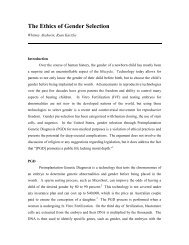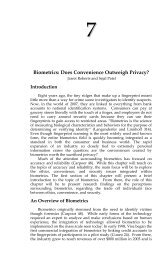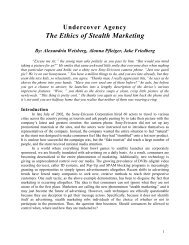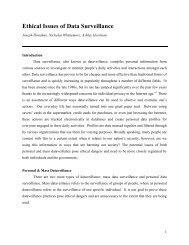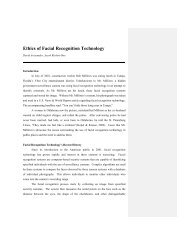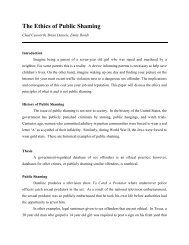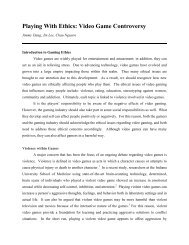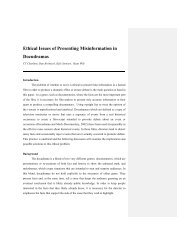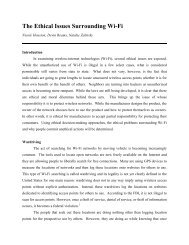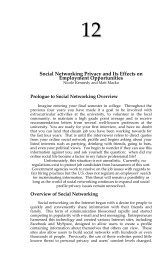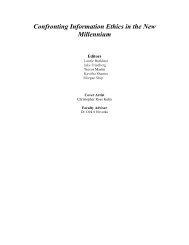Ethics of Stock Option Backdating - Ethicapublishing.com
Ethics of Stock Option Backdating - Ethicapublishing.com
Ethics of Stock Option Backdating - Ethicapublishing.com
You also want an ePaper? Increase the reach of your titles
YUMPU automatically turns print PDFs into web optimized ePapers that Google loves.
<strong>Ethics</strong> <strong>of</strong> <strong>Stock</strong> <strong>Option</strong> <strong>Backdating</strong><br />
Charles Geam, Matthew Rider, Marin Rutherford, Leah Semann<br />
_____________________________________________________________<br />
Introduction<br />
Executives backdating stock option grants led to a loss <strong>of</strong> approximately $500<br />
million per firm in returns to investors from 1995 to 2002. With over a 100 <strong>com</strong>panies<br />
being investigated for backdating, an ethical dilemma arises concerning the practice<br />
itself. The ethics <strong>of</strong> backdating are examined using a contract-based ethical framework,<br />
and the breakdown <strong>of</strong> ethics by the overwhelming number <strong>of</strong> participants is examined<br />
using moral disengagement. Through this analysis, the backdating <strong>of</strong> options is shown to<br />
be unethical, leading to the question <strong>of</strong> what should be done about it. Re<strong>com</strong>mendations<br />
are presented addressing the major weaknesses in backdating prevention. Through an<br />
acceptance <strong>of</strong> the unethical nature <strong>of</strong> backdating, and implementation <strong>of</strong> the forth<strong>com</strong>ing<br />
re<strong>com</strong>mendations, investor confidence can be regained to rebuild the efficiency <strong>of</strong> the<br />
current investor environment.<br />
Background on stock option grants and the advent <strong>of</strong> backdating<br />
<strong>Stock</strong> option grants, and other forms <strong>of</strong> performance-based <strong>com</strong>pensation, are a<br />
means <strong>of</strong> avoiding agency problems by tying executive <strong>com</strong>pensation to <strong>com</strong>pany<br />
performance. Agency problems are defined as managers not acting in the best interest <strong>of</strong><br />
shareholders. As a manager <strong>of</strong> any firm, the most important goal is to maximize returns<br />
to shareholders through growth and pr<strong>of</strong>it producing activities. <strong>Stock</strong> option grants are<br />
meant to align the incentives <strong>of</strong> executives with those <strong>of</strong> the shareholders. If a large<br />
portion <strong>of</strong> an executive‟s <strong>com</strong>pensation is in the form <strong>of</strong> stock options, there is a greater<br />
incentive to increase share price through value-adding activities. A raise in stock price<br />
increases both the value <strong>of</strong> the stock options as well as shareholder returns.<br />
This form <strong>of</strong> performance-based <strong>com</strong>pensation became increasingly favored over<br />
conventional salary <strong>com</strong>pensation during the 1990‟s. One reason was the boom <strong>of</strong> the<br />
technology industry, which used stock options to lure talented managers to their start-up
firms. Lacking the on-hand capital to pay large salaries to executives, stock options were<br />
<strong>of</strong>fered instead. This method <strong>of</strong> <strong>com</strong>pensation was incredibly attractive in the tech<br />
industry as booming growth dramatically raised stock prices, equating to huge gains for<br />
executives who exercised their options at the peak <strong>of</strong> industry performance. Another<br />
factor contributing to the popularity <strong>of</strong> stock option grants was the passing <strong>of</strong> Section<br />
162(m) <strong>of</strong> the federal tax laws in 1993, which placed a $1 million cap on <strong>com</strong>pensation<br />
that could be tax deductible on corporate tax returns (SEC, 2006). However, this change<br />
in tax law only placed a cap on executive salary and not on performance-based forms <strong>of</strong><br />
<strong>com</strong>pensation.<br />
<strong>Stock</strong> option grants <strong>com</strong>e in the form <strong>of</strong> call options, which allows the owner <strong>of</strong><br />
the option to buy the firm‟s stock at some given time in the future for a set price. <strong>Stock</strong><br />
options are granted “at the money,” meaning that the exercise price is set at the current<br />
market price, otherwise known as the “strike price,” <strong>of</strong> the stock at the time the option is<br />
granted. However, in some cases the option might be granted “in the money,” being set at<br />
a price lower than the current market price, and thus creating instant paper gains.<br />
Normally, stock option grants <strong>com</strong>e with a vesting period, in which the recipient cannot<br />
exercise the options. At the end <strong>of</strong> the vesting period, when the options are exercised, an<br />
executive <strong>com</strong>pensated in this manner stands to make a huge sum <strong>of</strong> money if the stock<br />
price has indeed appreciated since the date <strong>of</strong> issuance. A failure to increase the firm‟s<br />
value essentially makes the options worthless.<br />
The <strong>Backdating</strong> Scandal<br />
The recently publicized backdating scandal sheds light on managers retroactively<br />
changing the date an option was granted. Changing the grant date to a period when the<br />
stock price was lower than the original exercise price creates instant paper gains. While<br />
backdating stock options is not illegal, the improper disclosure <strong>of</strong> information in financial<br />
statements is. The way a stock option grant is reported has tax liability implications, and<br />
when a backdated stock option is improperly reported as having been granted “at the<br />
money” the corporation illegally avoids these tax liabilities. <strong>Option</strong>s granted “in the<br />
money” are not classified as performance-based <strong>com</strong>pensation, and do not qualify for the<br />
tax benefits <strong>of</strong> Section 162(m). Misleading disclosure reduces corporate transparency and
could possibly violate shareholder-approval requirements set by the New York <strong>Stock</strong><br />
Exchange and NASDAQ (ISS, 2006). Before the creation <strong>of</strong> the Sarbanes-Oxley Act <strong>of</strong><br />
2002, a <strong>com</strong>pany did not have to report stock option grants until 45 days after the end <strong>of</strong><br />
the fiscal year they were granted (ISS, 2006). This lengthy window <strong>of</strong> opportunity<br />
allowed many executives to reset their grant dates to coincide with days where the stock<br />
was trading at its lowest. The Sarbanes-Oxley Act attempts to rectify this problem and<br />
minimize the opportunity to backdate by requiring <strong>com</strong>panies to report an option grant<br />
within two business days.<br />
In a March 18, 2006 Wall Street Journal article, Erik Lie, an associate pr<strong>of</strong>essor<br />
<strong>of</strong> finance at the University <strong>of</strong> Iowa, examined the stock option grants <strong>of</strong> several<br />
<strong>com</strong>panies during the period from 1995 to mid-2002. The research showed that many<br />
executives were granted options immediately before large gains on the stock price. Mr.<br />
Lie made the observation that the sharp increase in stock price after option grant dates<br />
was indicative <strong>of</strong> option backdating. To eliminate the possibility <strong>of</strong> coincidence, a single<br />
executive‟s grant dates were analyzed. Affiliated Computer Services Inc.‟s then<br />
president, Jeffery Rich, was the focus <strong>of</strong> the analysis, taking a look at his option grants in<br />
1998. ACS stock price rose 60.2% during the 20-day period immediately following his<br />
stock option grant. This huge gain was the best 20-trading-day period all year for ACS<br />
(WSJ, 2006). This sort <strong>of</strong> “perfectly-timed” grant date was not isolated to ASC and<br />
Jeffery Rich, but to many senior executives at numerous firms. A look at probabilities<br />
would show that any stock option grant should be followed by mixed performance, with<br />
some stock prices going up and some going down. In some instances the options were<br />
“spring-loaded,” being granted immediately before the release <strong>of</strong> good news that was<br />
expected to increase stock price.<br />
The <strong>Ethics</strong> <strong>of</strong> <strong>Backdating</strong><br />
The ethical issue <strong>of</strong> stock option backdating has to do with the deception <strong>of</strong><br />
shareholders by firm managers. Since managers are charged with increasing shareholder<br />
value, an ethical dilemma arises when executives alter stock option grant dates to<br />
increase their own <strong>com</strong>pensation, effectively reducing returns to shareholders. <strong>Ethics</strong> also<br />
<strong>com</strong>e into consideration when managers provide misleading information to the
shareholders, by way <strong>of</strong> financial statements, as to the amount <strong>of</strong> <strong>com</strong>pensation they are<br />
receiving for the services they render. Reducing corporate transparency leads to a loss <strong>of</strong><br />
shareholder confidence, and violates the social and legal contract executives entered into<br />
with the shareholders when they accepted a position at the <strong>com</strong>pany. Misleading and<br />
deceptive information is unethical when there is a contractual obligation to provide<br />
honest and accurate information.<br />
<strong>Backdating</strong> violates the ethics <strong>of</strong> the manager/shareholder contract-based<br />
framework. An implicit agreement is said to exist between individuals and the groups<br />
they belong to. This agreement dictates the rights and responsibilities <strong>of</strong> the individuals<br />
within the group. This framework applies to executives, in that they work at a firm on a<br />
voluntary basis, and this choice is what obligates them to act ethically. In the case <strong>of</strong> most<br />
executives, the agreement is more than an implicit one, since they are explicitly defined<br />
by actual, legal contracts <strong>of</strong> employment as well as by the laws and regulations <strong>of</strong> the<br />
society in which they operate. Some might argue that the social contract theory does not<br />
hold in the case <strong>of</strong> government regulation, in this case taxation, because the agreement is<br />
not entered voluntarily but rather through government force. However, the unethical<br />
behavior is not reliant on the tax evasion property <strong>of</strong> backdating, but on the detriment<br />
caused to the shareholders that the executives work for. <strong>Backdating</strong> directly reduces<br />
returns that the shareholders would have otherwise realized. According to a contract-<br />
based ethical framework, the act <strong>of</strong> backdating and misrepresentation <strong>of</strong> <strong>com</strong>pensation<br />
practices is unethical.<br />
Moral Disengagement<br />
It can be argued that only a few managers at a few firms might take advantage <strong>of</strong><br />
loopholes to increase their <strong>com</strong>pensation. This counterargument is the basis for the belief<br />
that backdating was not a product <strong>of</strong> a widespread breakdown <strong>of</strong> ethics, but in actuality<br />
the wrongdoings <strong>of</strong> a few individuals with each situation being detached from the rest.<br />
However, a recent joint investigation by the Securities and Exchange Commission and<br />
Justice Department has found potentially fraudulent behavior with executive stock option<br />
grants at more than 120 <strong>com</strong>panies. The question is then, how did so many executives, all<br />
at different <strong>com</strong>panies, <strong>com</strong>e to take part in this unethical act? The answer is moral
disengagement. Moral disengagement occurs when an unethical behavior is justified or<br />
euphemistically labeled. In this case, executives referring to the act <strong>of</strong> theft as<br />
“backdating an option” make the act much more palatable. In a survey conducted by a<br />
corporate governance research firm, The Corporate Library, 51 <strong>of</strong> the 120 <strong>com</strong>panies<br />
being investigated for backdating had directors that sat on multiple boards within the<br />
group <strong>of</strong> <strong>com</strong>panies being probed (CNNMoney.<strong>com</strong>, 2006). As an increasing number <strong>of</strong><br />
managers took part in backdating options, a diffusion <strong>of</strong> responsibility occurred. The idea<br />
that, “Everyone else is benefiting from this, why shouldn‟t I?” takes hold and allows the<br />
manager to minimize, ignore, or misconstrue the consequences <strong>of</strong> their unethical<br />
behavior. Dehumanizing the victim also facilitates moral disengagement, by viewing the<br />
shareholders as a large faceless entity the unethical behavior is allowed to continue<br />
without recourse.<br />
Re<strong>com</strong>mendations<br />
There are ways to reduce the occurrence <strong>of</strong> backdating while still providing the<br />
benefits <strong>of</strong> a performance-based form <strong>of</strong> <strong>com</strong>pensation. Re<strong>com</strong>mendations have been<br />
made by many organizations that deal with corporate governance. To address the existing<br />
problems in the option granting process, a number <strong>of</strong> possible remedies have been<br />
researched and are presented here.<br />
Access to Non-Public, Potentially Market-Moving Information<br />
Rules already exist for stock purchases and sales by insiders because the<br />
information they possess is not available to the public. The existence <strong>of</strong> potentially<br />
market-moving information reduces investor confidence, which negatively effects the<br />
operation <strong>of</strong> an efficient market. If investors believe that the market is not fair, with<br />
certain individuals having an advantage over the rest, they will be<strong>com</strong>e unwilling to<br />
participate. Lack <strong>of</strong> investor participation will cause the free flow <strong>of</strong> capital from lenders<br />
to borrowers to cease and cause detrimental effects to the economy. This is, <strong>of</strong> course, a<br />
worst-case scenario, but it is the underlying reasoning behind the regulations already in<br />
place. To remedy the problem <strong>of</strong> “spring-loaded” options, regulations can be enacted that<br />
would create a blackout period for executives privy to market-moving information. The
lackout period would prevent executives from timing their options to be granted just<br />
prior to the release <strong>of</strong> the information.<br />
Enforcement <strong>of</strong> Existing Reporting Regulations<br />
The Sarbanes-Oxley Act <strong>of</strong> 2002 amended portions <strong>of</strong> the Securities Exchange<br />
Act, requiring the reporting <strong>of</strong> a stock option within two business days <strong>of</strong> the grant. <strong>Stock</strong><br />
option grants, as well as option exercises, require the filing <strong>of</strong> a Form 4 within two<br />
business days <strong>of</strong> the transaction. However, there is a clause in the rule that exempts the<br />
two-business-day reporting period if it is deemed that it would not be “feasible” to report<br />
the grant within the timeframe. Many <strong>com</strong>panies continue to report option grants beyond<br />
the two-day required time period. This loophole can be remedied through stricter<br />
enforcement <strong>of</strong> the Sarbanes-Oxley Act by regulating bodies such as the SEC. If large<br />
monetary penalties were levied or transactions were negated the occurrence <strong>of</strong> backdating<br />
could be reduced.<br />
The Timeframe and Frequency <strong>of</strong> <strong>Stock</strong> <strong>Option</strong> Grants<br />
Normally, most <strong>com</strong>panies grant stock options once a year. However, there is no<br />
regulation guiding when, or how frequently, a stock option can be issued. By allowing<br />
the stock option to be granted on any day <strong>of</strong> the fiscal year, it allows executives to<br />
research stock prices and backdate their options to the most desirable date. To minimize<br />
this problem a fixed grant date schedule could be adopted. <strong>Stock</strong> options would be<br />
granted on a periodic basis (monthly, quarterly, or annually), along with rules that would<br />
govern option exercise prices on grant dates. Requiring a disclosure <strong>of</strong> the rationale for<br />
grants on a certain date would also help to prevent his problem. An explanation <strong>of</strong> why<br />
the <strong>com</strong>pensation <strong>com</strong>mittee chose a certain date, over other possible dates, would<br />
mitigate the problem <strong>of</strong> fraudulent backdating. These requirements would inhibit<br />
executives from picking specific low-stock price days to maximize <strong>com</strong>pensation.<br />
The recent exposure <strong>of</strong> the backdating scandal in the United States has left many<br />
investors wary <strong>of</strong> executive <strong>com</strong>pensation practices. Regardless <strong>of</strong> the legality <strong>of</strong><br />
backdating, its inherent untruthfulness and the financial detriment to the shareholders<br />
make it unethical. A contractual-based ethical framework dictates that the voluntary
nature <strong>of</strong> an executive‟s employment inherently obligates them to act in an ethical<br />
manner conducive to the group he belongs to. The vast number <strong>of</strong> executives and<br />
corporations involved in the current scandal implies a level <strong>of</strong> moral disengagement,<br />
brought upon by the social networking <strong>of</strong> many <strong>of</strong> the directors involved. Tighter<br />
regulations regarding the use <strong>of</strong> market-moving information and the timing <strong>of</strong> option<br />
grants, as well as enforcement <strong>of</strong> existing regulation are re<strong>com</strong>mendations for the<br />
eradication <strong>of</strong> backdating. Unethical practices in the business environment have begun to<br />
diminish the confidence people have in corporations, and a lack <strong>of</strong> trust will lead to larger<br />
economic problems.<br />
Works Cited<br />
Allen, Ted and Mishra, Subodh. “An Investor Guide to the <strong>Stock</strong> <strong>Option</strong> Timing<br />
Scandal.” Institutional Shareholder Services. 2006. 17 Oct. 2006<br />
<br />
“CFA Centre Calls For Greater Scrutiny Of „Spring Loading‟ Practices, Restricted <strong>Stock</strong><br />
Grants, Off-Balance-Sheet Reporting.” CFA Institute. 2006. 18 Oct. 2006\<br />
http://www.cfainstitute.org/aboutus/press/release/06releases/20060906_01.html<br />
Choi, Yoonhee. “<strong>Stock</strong> <strong>Option</strong> <strong>Backdating</strong> and Disclosure Requirement.” 2006. The<br />
Journal <strong>of</strong> The Business Law Society. 18 Oct. 2006. University <strong>of</strong> Illinois College<br />
<strong>of</strong> Law.<br />
.<br />
Forelle, Charles. “How the Journal Analyzed <strong>Stock</strong> <strong>Option</strong> Grants.” Yale University.<br />
2006. The Wall Street Journal. 20 Oct. 2006<br />
<br />
Heron, Randall A. “What Fraction <strong>of</strong> <strong>Stock</strong> <strong>Option</strong> Grants Have Been Backdated or<br />
Manipulated.” Institutional Shareholder Services. 2006. Indiana University. 19<br />
Oct. 2006 <br />
“Managing the Risks Associated with <strong>Stock</strong> <strong>Option</strong>s <strong>Backdating</strong>.” OpenPages. 2006.
18 Oct. 2006<br />
<br />
Maremont, Mark. “Authorities Probe Improper <strong>Backdating</strong> <strong>of</strong> <strong>Option</strong>s.” The Wall Street<br />
Journal.2005. Post Gazette. 20 Oct. 2006 <br />
Pasha, Shaheen. “Psst! Heard About How Easy <strong>Backdating</strong> Is?” CNN Money. 2006. 22<br />
Oct. 2006<br />
<br />
Thomsen, Linda. “Testimony Concerning Executive Compensation and <strong>Option</strong>s<br />
<strong>Backdating</strong> Practices.” 2006. US Securities and Exchange Commission. 20 Oct.<br />
2006 <br />
Vranceanu, Radu. “Manager Unethical Behavior During the New Economy Bubble.”<br />
ESSEC Research Center. 2003. 20 Oct. 2006<br />
<br />
Zecca, Anthony. “Now is the Time for Business <strong>Ethics</strong>.” US Business Review. 2006<br />
19 Oct. 2006.


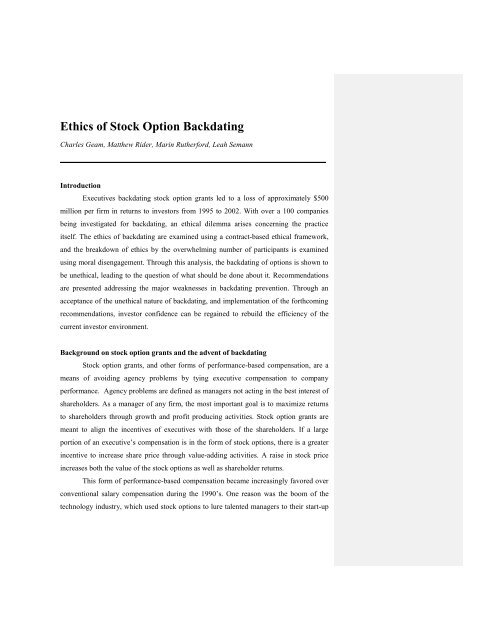
![Download Entire Book [PDF] - Ethicapublishing.com](https://img.yumpu.com/19531485/1/190x245/download-entire-book-pdf-ethicapublishingcom.jpg?quality=85)
![Download Entire Book [PDF] - Ethicapublishing.com](https://img.yumpu.com/19531484/1/190x245/download-entire-book-pdf-ethicapublishingcom.jpg?quality=85)
